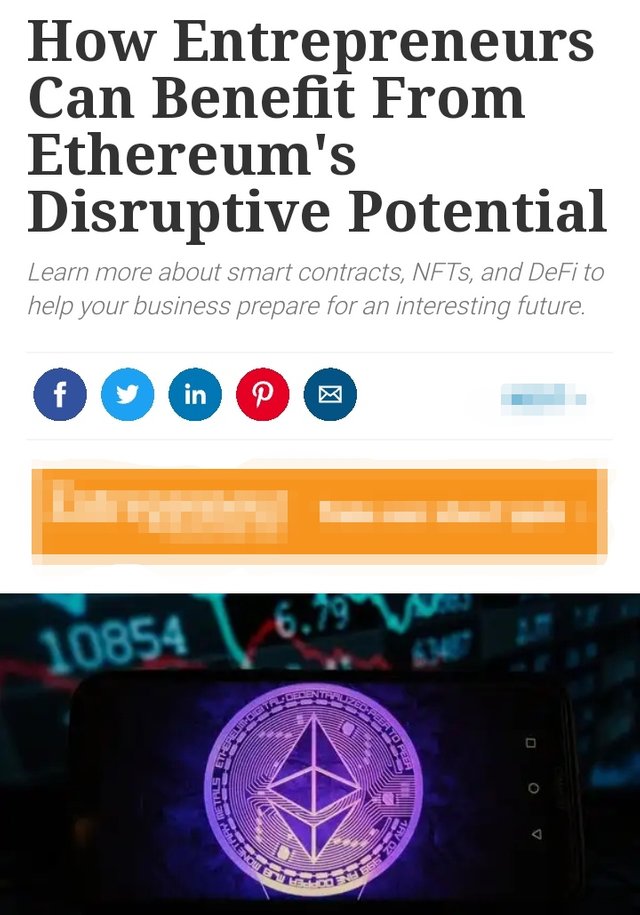WHAT IS THE FUTURE BLOCKCHAIN TO DISRUPT EVERYTHING?
As Bitcoin, Ethereum, and other cryptocurrencies make headlines year after year, bystanders experience FOMO reading stories about other people becoming millionaires. Unfortunately, many of these stories have less to do with the impressive uses of blockchain technology and more to do with wild speculation, criminal activity, and old memes.
I’m a professional accountant who’s been following this topic for several years now. From my perspective, the crypto market is currently too young and volatile to fully implement many of its most promising applications— but a lot of progress has been made towards fixing this.
Instead of throwing money at something you might not fully understand, I think it’s a much better idea to learn more about this subject. Knowing what cryptocurrency is, how it works, and how it can disrupt many longstanding industries can lead to lucrative entrepreneurial opportunities in the near future.
Here are just a few ways this new tech has started shaking things up!
Decentralized Finance (DeFi)
The modern financial industry has been responsible for some of the 21st century’s most incredible innovations. It’s safe to say that the crop of wildly successful businesses based in Silicon Valley wouldn’t exist without venture capitalists and the stock market.
However, it’s also been a magnet for corruption and fraud, which carry the consequences of crashing economies on a national and global scale. But what if we had a financial system that was resistant to bad actors that still allowed promising businesses to raise lots of money? That’s the goal of DeFi, short for Decentralized Finance. It’s a movement that seeks to revamp the entire finance industry from top to bottom.
Blockchains — the tech powering Bitcoin and Ethereum — are theoretically capable of supporting familiar financial structures. These implementations wouldn’t just be faster and more versatile; they would also be safer and more transparent due to the use of a decentralized public ledger.
How it’s disruptive (and how to benefit)
As an accountant, auditing is one of my primary job duties. It’s big business to track the value of assets and their owners— ask the IRS. But many current auditing methods, such as point-in-time forensic analysis, are rendered obsolete because of blockchain technology. As Bitcoin, Ethereum, and their derivatives grow in utility and market share, this discrepancy will become more significant, which will require licensed auditors to rethink their approach fundamentally.
If you’re an accountant or auditor, the best way to future-proof yourself is to research blockchain technology and understand how to audit its assets accurately. Further, having a private accounting practice specializing in handling Bitcoin can help you stand out from the competition and embrace a growing demographic of potential customers. This is also a fantastic opportunity to educate other professionals in your industry. Speaking from my own experience, I can tell you that a reputable certification program for crypto accounting will only become more important over time.
Related: Decentralized Finance Is on the Rise. What You Need to Know in 2021.
Initial Coin Offerings (ICOs) and Decentralized Exchanges (DEX)
Another way that DeFi differs from traditional financial models involves securities trading. Instead of making an Initial Public Offering (IPO), many DeFi companies offer Initial Coin Offerings (ICOs). In lieu of shares in a company, investors can purchase individual tokens valued in relation to other cryptocurrencies such as Bitcoin and Ether. These are commonly referred to as altcoins and are sold on a decentralized exchange (DEX), which functions similarly to a stock exchange.
Some companies approach an ICO the same as an IPO; they set a price and let the market decide whether it increases or decreases. However, cryptocurrency uses advanced technology that allows for far more versatile applications, and they’re not regulated very harshly by government agencies. But that doesn’t mean they’re completely unregulated— the SEC will still step in if they suspect foul play, like in the cases of Telegram and Ripple.
Other than overt cases of fraud or insider trading, the decentralized nature of coin exchanges results in a hands-off experience where the platform can effectively regulate itself. So while there’s still the risk of bad actors, this means it’s not really possible for a situation like the one involving Robinhood and Gamestop stock to occur on a DEX with an ICO.
How it’s disruptive (and how to benefit)
It’s important to understand that owning a company’s token doesn’t equate to a share of the business. Because of this, a coin’s value doesn’t necessarily have to reflect that of the business that created it, and there’s no real need for a finite supply.
Because of this, many companies can use ICOs as a form of crowdfunding similar to a Kickstarter campaign. Alternatively, tokens sold can have a fixed price that’s tied to traditional currency, such as the US dollar. These are referred to as stablecoins, which can eliminate volatility and serve as a clear valuation of the business.
However, the most important distinction to make between ICOs and IPOs is that the tokens sold are an extension of the company’s product or service; in fact, it may even be the product or service itself. In this context, you can even think of an ICO as a software launch— which leads into the next topic.
Smart contracts
The underlying principle behind Bitcoin’s value is blockchain technology, as outlined in the original whitepaper written by Satoshi Nakamoto. Ethereum was created to build on blockchains' possibilities by allowing users to create decentralized apps (dapps). These dapps can store their data on Ethereum’s blockchain, but all code is written in the form of smart contracts.
How it’s disruptive (and how to benefit)
Unlike standard legal contracts that are written once and then modified in the future, smart contracts are dynamic; the conditions and values negotiated can adapt to a wide range of variables. This means that coding languages and algorithms can be used to revitalize legacy industries, such as logistics, and improve the accuracy of others, like insurance.
Interestingly enough, the biggest impediment to this technology’s disruptive potential is the revolutionary tech on which it’s based. Blockchains are incredibly useful in theory, but there’s still a tremendous amount of data in many longstanding industries that are essentially inaccessible. (There are also serious problems with scalability— more on that later.)
If you’re knowledgeable in computer science and mathematics, you can absolutely benefit from learning more about the various projects currently underway to resolve these issues. Getting involved in any of these projects can be extremely lucrative further down the line— just ask the folks behind Chainlink.
Non-Fungible Tokens (NFTs)
While blockchain technology currently struggles to implement many older industries, it’s had a profound impact on art— more specifically, on the way we distribute it and claim ownership of it in the digital age. To list digital art on specially designed exchanges and auction houses, NFTs are a method of demonstrating ownership and preventing piracy.
Short for non-fungible token, this is a digital file that can be tracked on a blockchain. A drastic simplification would be that they’re a cross between collectible coins and trading cards. The term non-fungible means that these tokens aren’t interchangeable with regular currency; they’re considered unique and have no set price. Naturally, this has led to a massive speculative bubble fueled by celebrities where a video clip or social media post can sell for over six figures.
How it’s disruptive (and how to benefit)
While NFTs are currently treated like a gimmick, there are many ways they can benefit artists and creators working in the digital space. Look at how rock band Kings of Leon implemented NFTs into their latest album release to see how this tech can increase a creator’s revenues and increase engagement with their followers.
Aside from art, NFTs can easily be implemented as an anti-piracy measure for software. Most current forms of Digital Rights Management (DRM) are extremely unpopular among consumers due to privacy concerns and bloated system requirements; solving the issues of a $300 billion-plus market size industry would undoubtedly be a profitable move.
Key takeaways
As I said at the beginning, there’s way too much volatility and risk for me to recommend diving headfirst into ICOs, DeFi, and NFTs. There’s also a significant problem with scalability when it comes to any Ethereum-based project (which is essentially all DeFi projects), so a disproportionate amount of money will be spent on gas fees.
Having to spend more money than you make on transaction fees isn’t viable for many uses and is actually counter-intuitive to one of the major selling points of DeFi— making finance more accessible and able to accommodate smaller transactions. This could be why growth projections for the smart contracts market in the near future aren’t as impressive as you may currently be led to believe.
However, this also means that there’s one more huge opportunity for entrepreneurs. If you research the technology behind these cutting-edge tech developments, you can play a role in resolving many of its issues.
You could create an efficient and functional blockchain-based coding language or learn an existing one to create dapps. You could also explore the applications of blockchains, DeFi, and NFTs for old business models and industries, potentially discovering an untapped market. Or you can find some completely new and unprecedented opportunity, playing a pivotal role in future history books covering economics in the 21st century. Who knows?

